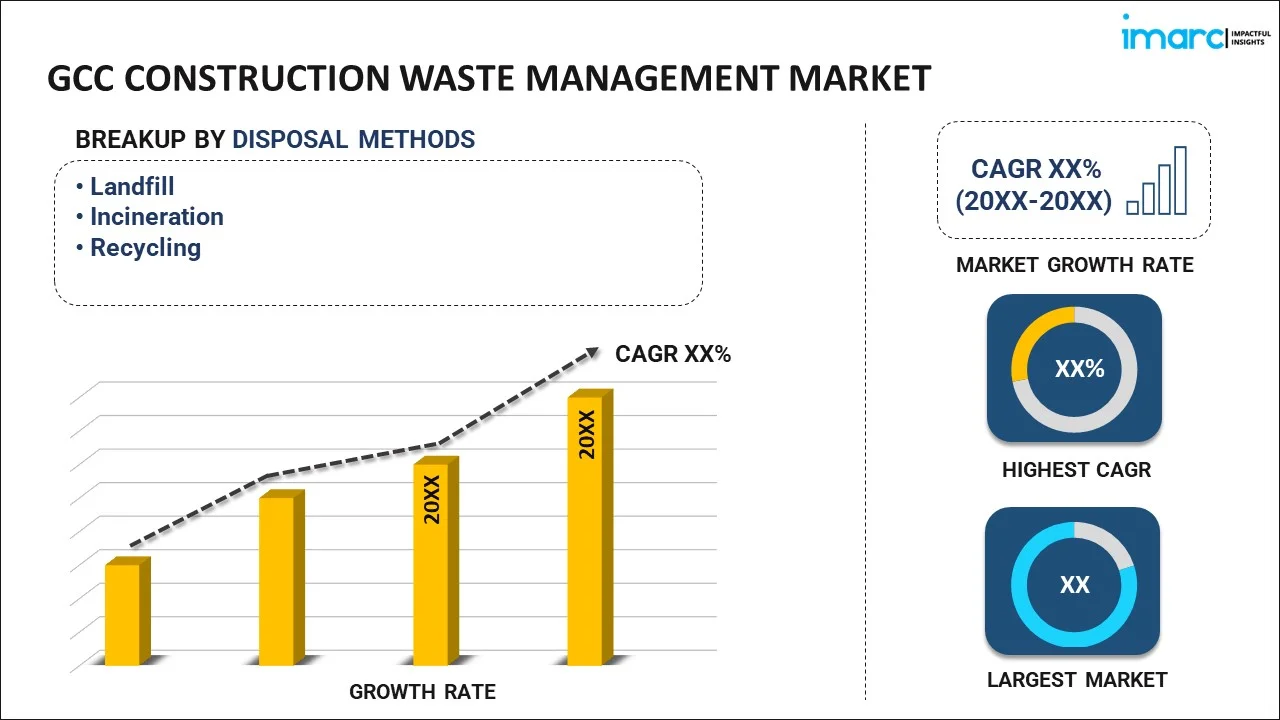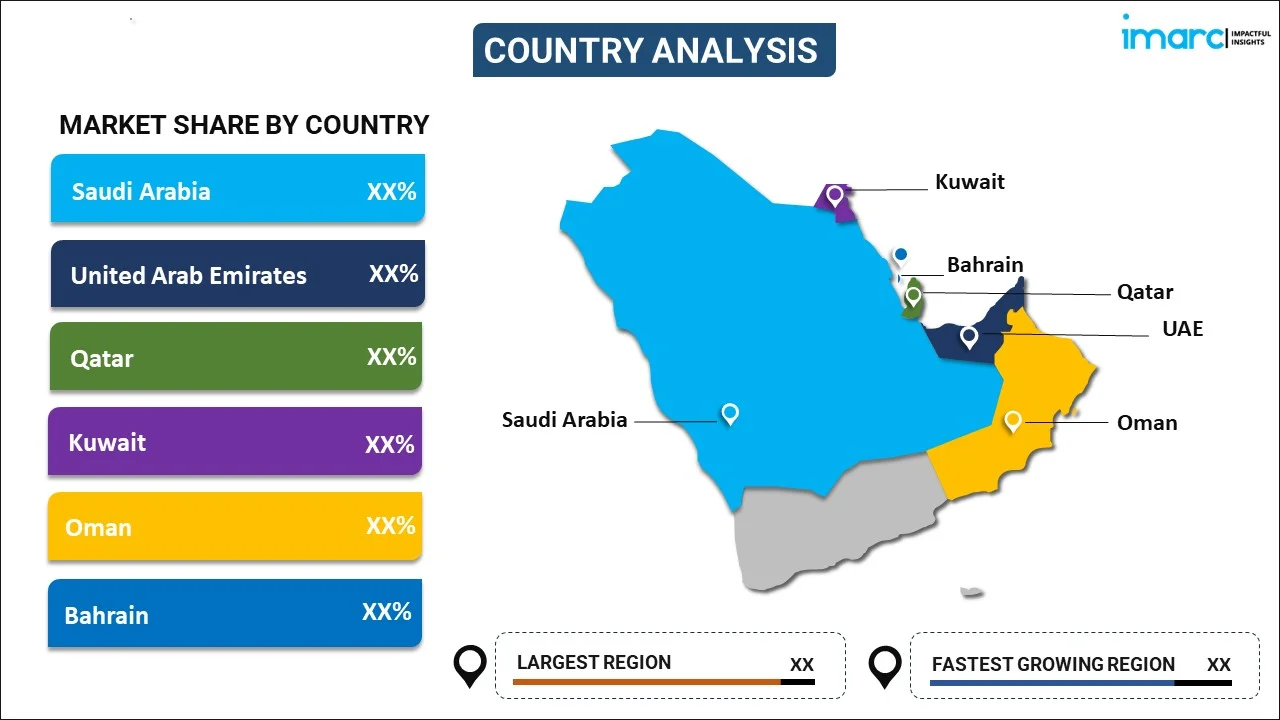
GCC Construction Waste Management Market Report by Disposal Method (Landfill, Incineration, Recycling), Service (Collection Service, Collection and Transportation, Storage and Handling, Sorting, Disposable Service, Landfills, Recycling, Compositing and Anaerobic Digestion), Material (Paper and Paperboard, Plastic, Metal, Glass, Food, and Others), and Country 2026-2034
Market Overview:
The GCC construction waste management market size reached USD 7.8 Billion in 2025. Looking forward, IMARC Group expects the market to reach USD 13.5 Billion by 2034, exhibiting a growth rate (CAGR) of 6.23% during 2026-2034. The increasing construction activities, rising environmental consciousness, the development of smart cities, launch of advanced waste management technologies and equipment, growing partnerships and collaborations and favorable government policies represent some of the key factors driving the market.
|
Report Attribute
|
Key Statistics
|
|---|---|
|
Base Year
|
2025 |
|
Forecast Years
|
2026-2034 |
|
Historical Years
|
2020-2025
|
| Market Size in 2025 | USD 7.8 Billion |
| Market Forecast in 2034 | USD 13.5 Billion |
| Market Growth Rate (2026-2034) | 6.23% |
Access the full market insights report Request Sample
Construction waste management is a strategic approach aimed at optimizing the handling, disposal, and recycling of waste generated during construction activities. It includes planning, collection, transport, disposal, recycling, and monitoring waste generated from construction activities. The process is designed to manage a variety of waste materials, including concrete, wood, metals, plastics, and glass. It focuses on recycling and reusing these materials to promote sustainability. Construction waste management employs specialized equipment, like crushers, separators, and balers. It is utilized in various sectors, such as residential and commercial buildings, and large-scale infrastructure projects, such as highways and bridges. The construction waste management approach offers numerous benefits, such as environmental conservation, reduced disposal costs, and compliance with regulatory mandates. Furthermore, the process fosters resource efficiency, minimizes the load on landfills, and ultimately contributes to sustainable construction practices, making it a cost-effective and responsible choice for the construction industry.
GCC Construction Waste Management Market Trends:
The increasing demand for construction waste management owing to the growing construction activities in the region that necessitates effective waste management solutions is one of the major factors creating a positive outlook for the market growth. Additionally, the rising environmental consciousness and stricter government regulations compelling companies to adopt sustainable practices are providing a thrust to the market growth. Besides this, rapid technological advancements in waste processing equipment, making it easier and more cost-effective to recycle and reuse materials, are positively impacting the market growth. Moreover, the growing shift towards the development of smart cities in the region demanding eco-friendly construction methods, including efficient waste management, is providing an impetus to the market growth. In addition to this, the increasing demand for construction waste management due to the rising costs of raw materials that make recycling a financially viable option is supporting the market growth. Along with this, the growing public awareness about the importance of environmental sustainability, and making waste management solutions an operational requirement, are also favoring the market growth. Furthermore, the increasing popularity of integrated waste management solutions, as they offer a comprehensive approach to handling different types of construction waste, is favoring the market growth. Furthermore, the implementation of government initiatives, such as incentives for using recycled materials and penalties for illegal dumping, reinforcing the adoption of efficient waste management practices, is providing remunerative growth opportunities for the market.
GCC Construction Waste Management Industry Segmentation:
IMARC Group provides an analysis of the key trends in each segment of the GCC construction waste management market report, along with forecasts at the regional and country levels for 2026-2034. Our report has categorized the market based on disposal method, service and materials.
Breakup by Disposal Method:

To get detailed segment analysis of this market Request Sample
- Landfill
- Incineration
- Recycling
The report has provided a detailed breakup and analysis of the market based on the disposal method. This includes landfill, incineration, and recycling.
Breakup by Service:
- Collection Service
- Collection and transportation
- Storage and Handling
- Sorting
- Disposable Service
- Landfills
- Recycling
- Compositing and Anaerobic Digestion
A detailed breakup and analysis of the market based on the service has also been provided in the report. This includes collection service, collection and transportation, storage and handling, sorting, disposable service, landfills, recycling and compositing and anaerobic digestion.
Breakup by Materials:
- Paper and Paperboard
- Plastic
- Metal
- Glass
- Food
- Others
A detailed breakup and analysis of the market based on the material has also been provided in the report. This includes paper and paperboard, plastic, metal, glass, food and others.
Breakup by Country:

To get detailed regional analysis of this market Request Sample
- Saudi Arabia
- UAE
- Qatar
- Bahrain
- Kuwait
- Oman
The report has also provided a comprehensive analysis of all the major regional markets, which include Saudi Arabia, the UAE, Qatar, Bahrain, Kuwait, and Oman.
Competitive Landscape:
The report has also provided a comprehensive analysis of the competitive landscape in the market. Competitive analysis such as market structure, key player positioning, top winning strategies, competitive dashboard, and company evaluation quadrant has been covered in the report. Also, detailed profiles of all major companies have been provided.
GCC Construction Waste Management Market Report Scope:
| Report Features | Details |
|---|---|
| Base Year of the Analysis | 2025 |
| Historical Period | 2020-2025 |
| Forecast Period | 2026-2034 |
| Units | Billion USD |
| Scope of the Report | Exploration of Historical and Forecast Trends, Industry Catalysts and Challenges, Segment-Wise Historical and Predictive Market Assessment:
|
| Disposal Methods Covered | Landfill, Incineration, Recycling |
| Services Covered | Collection Service, Collection and transportation, Storage and Handling, Sorting, Disposable Service, Landfills, Recycling, Compositing and Anaerobic Digestion |
| Materials Covered | Paper and Paperboard, Plastic, Metal, Glass, Food, Others |
| Countries Covered | Saudi Arabia, the UAE, Qatar, Bahrain, Kuwait, Oman |
| Customization Scope | 10% Free Customization |
| Post-Sale Analyst Support | 10-12 Weeks |
| Delivery Format | PDF and Excel through Email (We can also provide the editable version of the report in PPT/Word format on special request) |
Key Questions Answered in This Report:
- How has the GCC construction waste management market performed so far and how will it perform in the coming years?
- What has been the impact of COVID-19 on the GCC construction waste management market?
- What is the breakup of the GCC construction waste management market on the basis of disposal method?
- What is the breakup of the GCC construction waste management market on the basis of service?
- What is the breakup of the GCC construction waste management market on the basis of material?
- What are the various stages in the value chain of the GCC construction waste management market?
- What are the key driving factors and challenges in the GCC construction waste management market?
- What is the structure of the GCC construction waste management market and who are the key players?
- What is the degree of competition in the GCC construction waste management market?
Key Benefits for Stakeholders:
- IMARC’s report offers a comprehensive quantitative analysis of various market segments, historical and current market trends, market forecasts, and dynamics of the GCC construction waste management market from 2020-2034.
- The research study provides the latest information on the market drivers, challenges, and opportunities in the GCC construction waste management market.
- Porter's five forces analysis assist stakeholders in assessing the impact of new entrants, competitive rivalry, supplier power, buyer power, and the threat of substitution. It helps stakeholders to analyze the level of competition within the GCC construction waste management industry and its attractiveness.
- Competitive landscape allows stakeholders to understand their competitive environment and provides an insight into the current positions of key players in the market.
Need more help?
- Speak to our experienced analysts for insights on the current market scenarios.
- Include additional segments and countries to customize the report as per your requirement.
- Gain an unparalleled competitive advantage in your domain by understanding how to utilize the report and positively impacting your operations and revenue.
- For further assistance, please connect with our analysts.
 Request Customization
Request Customization
 Speak to an Analyst
Speak to an Analyst
 Request Brochure
Request Brochure
 Inquire Before Buying
Inquire Before Buying




.webp)




.webp)












